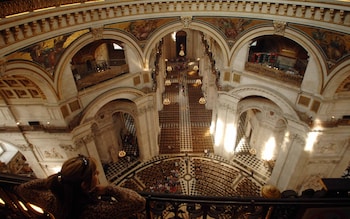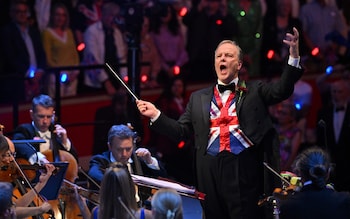When considering the sorry fate of so many pianos and pipe organs, a heartbreaking scene from Toy Story 3 comes to mind. A motley crew of abandoned toys, including a piggy bank, a Slinky dog, a cowboy doll and a space action figure, find themselves on a scrap heap, and on the brink of incineration. Luckily, they manage to escape – but other once-beloved possessions are not so lucky.
According to the organ heritage charity Pipe Up for Pipe Organs’ calculations, an estimated four pipe organs are being sent to landfill every week in Britain. Things reached breaking point in 2022, when Pipe Up was created – indeed, one of its co-founders, Martin Renshaw, an organ builder of 60 years, said the charity emerged “through desperation” at the extent of the wreckage.
The work of the Pianodrome company, co-owned by bandmates Tim Vincent-Smith and Matthew Wright, gives a similarly gloomy sense of the level of destruction of pianos. Alongside building the world’s first amphitheatre made entirely from upcycled pianos in 2017, the pair also run an Adopt-a-Piano scheme. It’s “a dog and cat home for lost pianos”, Vincent-Smith explains – they restore the excess, playable pianos they have left after building their amphitheatres, and display them in their showroom for browsing and rehoming by owners of hotels, restaurants, bars and private homes, in return for a donation to Pianodrome that reflects the instrument’s quality and level of restoration. The scheme only began 18 months ago, but in that time, they have already rehomed 180 pianos – so, 10 per month.
It’s desperately sad to think that the final notes of these majestic instruments might not be those of music, but the clink-clank-clunk at the bottom of a skip. But why are pipe organs being abandoned?
“A fall in church-going,” says Renshaw, whose Pipe Up charity rescues, stores and rehomes organs at risk of destruction, and provides guidance to owners unsure of how to maintain their instrument. Less footfall in churches means less funding, which means the homes of these organs are closing. Pipe Up estimates one church closes per day in Britain – with pipe organs and pianos trapped inside.
Rescue missions aren’t simple – churches without an organ first need to decide if they want to rehome one; then persuade their stakeholders, raise money to buy it and get the paperwork through. Renshaw despairs: “It takes literally years!”
These are big instruments, and difficult to store, so Pipe Up can’t always rescue the organs from the churches they visit. “It often happens that we have nowhere to put them, and therefore, we can’t take them.”
Another issue is that custodians of pipe organs don’t always know how to maintain them. A church in Stoke Newington, north-east London, recently wanted to bin its organ, thinking it didn’t work. “Actually,” says Renshaw, “after four hours, we got quite a bit of it working.” Another problem, he adds, is that the number of good organ builders is dwindling – seven have died in the past six years. Organ building is now “an endangered craft”, he says. Only five or six people in Britain, Renshaw reckons, “could design and make the whole of an organ”.
What if many organs, like that in Stoke Newington (of which Renshaw estimates there are about 30 in London alone), could be saved just with some expert TLC?
“We’ve just got to pass [the craft of organ building] on,” says Renshaw, pointing to weekend afternoon courses, free as one of several benefits for Pipe Up members, which are usually fully booked. “The piano can’t survive without that culture around it,” Pianodrome co-founder Vincent-Smith concludes.
Having installed two open-to-the-public organs in the capital, one in London Bridge station (“It’s never not being played,” says Renshaw) and another at the Whitgift shopping centre in Croydon, Renshaw will install two more by January: at Headcorn in Kent, and Widecombe in Devon.
Hoping to inspire a young generation to tinkle the keys is the triennial Leeds International Piano Competition and associated Piano Trail Festival, on now. The festival programme, running alongside the competition, will see a “trail” of pianos around the streets of Leeds and Bradford, free piano lessons and free concerts.
Pianodrome are the “artists in resonance” with the competition. In 2021, they created 10 sculptures using parts from old pianos, including a 20ft-high tripod of elephant tusks, and a garden shed, which will return this year. Pianodrome’s new contribution is a flat-pack amphitheatre, which, says Vincent-Smith “comes apart into piano-sized chunks”.
“You start with a circle of 12 pianos with all their parts and strings inside, and three of those are still playable,” he says, “then you lift a whole series of pianos upside down to make the top circle of tiered seating.” From balustrades to bannisters, down to the screws that hold it all together, “It’s 100 per cent piano parts, so there’s nothing in the structure that is not taken from a piano which was on its way to the dump.”
Sally Egan, one of the Leeds International Piano Competition’s organisers, has witnessed the benefits of the festival first-hand. “I can think of two children that I have met: the only pianos they had access to were those on the Piano Trail,” she says. “One of them taught himself to play Rachmaninov by watching a YouTube video. He’s now at Chetham’s School of Music, in Manchester, studying the piano with Jonathan Middleton. And the other was a little girl from Ukraine, who was having Zoom lessons with her teacher back in Kharkiv, and she’s now got a scholarship to Yorkshire Young Musicians [a Sunday music centre].”
Perhaps stars are also being born in the West Midlands. In 2023, Charles Fillingham, the headmaster of Solihull School, was inspired to buy three pianos on eBay for £16, having been influenced by seeing the two public pianos at St Pancras station, in London. Added to three pianos donated by locals who no longer had use for them, the old joannas are now dotted around the school. Some Year 11 pupils were watching when one of the pianos was delivered. “I asked if one of them could play,” Fillingham recalls, “and they all looked at each other a little shyly, but then one boy stepped up and started knocking out Walking in Memphis from memory. Straightaway, a girl started to sing along – it was very impressive. We don’t have many Kids from Fame moments, but that was one of them.” He’s since been offered more pianos than he could take on – so has referred them to other schools.
I spoke to Martin Renshaw over Zoom during one of his breaks from organ building at a church near Lord’s Cricket Ground. “I’ll play you out,” he says at the end of our conversation, and turns to the organ console behind him to play me some Bach in the French style of organ-playing (“as it should be!”). Even through my ancient laptop’s tinny speakers, the notes ring out, strong and true.
The Leeds International Piano Competition runs until Sept 21; leedspiano.com
Disclaimer: The copyright of this article belongs to the original author. Reposting this article is solely for the purpose of information dissemination and does not constitute any investment advice. If there is any infringement, please contact us immediately. We will make corrections or deletions as necessary. Thank you.




